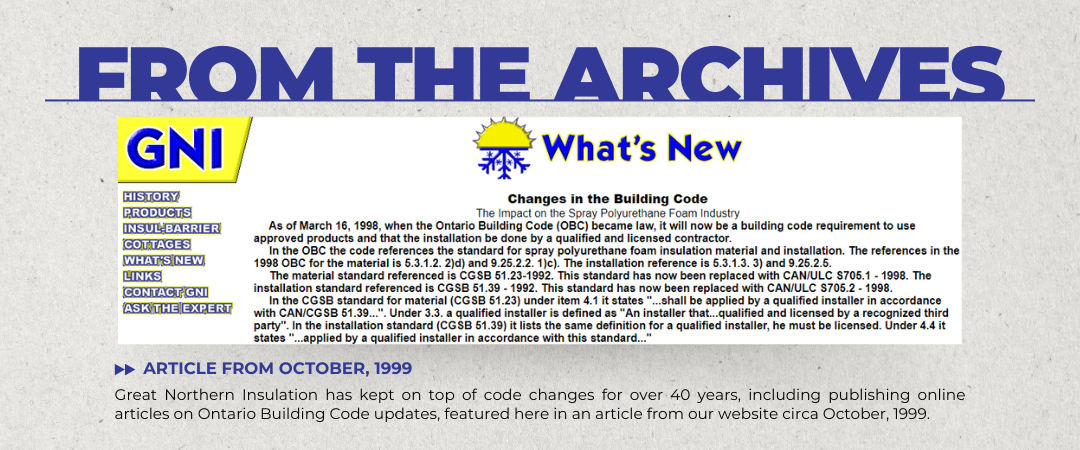Building a Better Ontario: Why the 2024 Building Code Changes Should Matter to You
Nov 08, 2024

Written by Bill Maginas, CEO of GNI Management Group Inc.
Major revisions to the Ontario Building Code (OBC) are relatively rare. In my time as CEO of Great Northern Insulation, we've seen numerous interim amendments to the 2012 OBC – there have been a total of 26 since its creation, to be exact. Now, with the 2024 Ontario Building Code on the horizon, we're facing the first title revision in over a decade. Let me share why these changes matter to all Ontarians, not just those in the construction industry.
Guiding Our Built Environment
Think of the building code as the rulebook for the buildings that make up our society. It sets the standards for how we construct, renovate, and maintain our buildings. But why should you, as a homeowner or building occupant, care about these seemingly technical regulations?
The answer is simple: building codes are the backbone that makes our buildings safe, comfortable, and energy efficient. They ensure that the roof over your head can withstand harsh Canadian winters, that your heating system keeps you warm without wasting energy, and that your home can be renovated to keep on top of future changes for generations.
Consider this: the 2021 Census found that 49% of surveyed Ontario homes were constructed before 1980. Those homes will have required upgrades and renovations over the years, but have likely housed multiple generations of Ontarians. As we approach constructing buildings in 2024, it's important to have a forward-looking mindset. The house or building we are building will stand for generations to come. How do we ensure it remains safe, efficient, and affordable to live in?
Evolution of Insulation Requirements
Let’s take attic insulation as an example of how building codes evolve. In the 1940s, when Canada only had a National Building Code, there was no standard for attic insulation. With the introduction of the Ontario Building Code in 1975, it became standard for homes to have a minimum attic insulation R-value (a measure of insulation effectiveness) somewhere between R-12 and R-20. By the 1990s, this average increased to around R-31. The 2012 OBC further raised the bar, requiring a minimum R-value of either R-50 or R-60 for attic insulation in most residential buildings, depending on the compliance package chosen by homeowners or homebuilders. This progression reflects our growing understanding of energy efficiency and the impact of climate on home insulation needs.
While the 2024 OBC doesn't introduce new attic insulation requirements, this history shows how building codes have consistently pushed for greater energy efficiency. At Great Northern Insulation, we recommend R-60 for attics to maximize energy savings and comfort, with extra focus put on air leakage control throughout the home.

Key Changes to the 2024 OBC
The 2024 OBC brings several important updates:
- Harmonization with National Standards: This alignment will streamline processes and reduce variations between provincial and national requirements.
- Enhanced Fire Safety: Updated provisions for fire protection systems in large buildings.
- Radon Mitigation: New homes will require a rough-in for a subfloor depressurization system.
- Secondary Suites: Harmonized requirements to support more flexible housing options.
- Farm Buildings: New provisions to address modern farming practices and safety.
What This Means for You
While many of the changes are technical in nature, their impact will be felt in the quality and performance of our buildings.
For homeowners, these updates could mean:
- More energy-efficient homes that are cheaper to heat and cool
- Improved indoor air quality for better health
- Potential for more flexible housing options, like secondary suites, that allow us to tackle our housing crisis
From Great Northern Insulation's perspective, the 2024 OBC aligns with our mission to create safe, energy-efficient buildings. By providing services that meet or exceed these standards, we're contributing to more sustainable communities across Ontario.
Building a Sustainable Future
Since our foundation in 1980, Great Northern Insulation has always believed that every building project is an opportunity to create a more sustainable future. The 2024 OBC reinforces this belief by emphasizing energy efficiency and sustainable practices.
These changes reflect a growing awareness that our homes and buildings play a crucial role in addressing not just climate change, but the affordability of everyday comfort. By constructing more efficient buildings today, we're investing in a greener, more sustainable and affordable Ontario for generations to come.
Staying Informed and Prepared
As we approach the implementation of the 2024 OBC, I encourage everyone to stay informed. Whether you're planning a renovation, considering building a new home, or simply curious about the future of construction in Ontario, understanding these changes can help you make better decisions.
Remember, while the building code sets the minimum standards, at Great Northern Insulation, we've always aimed to exceed these benchmarks. We're excited about the opportunities these changes bring and are ready to help you navigate them.
The 2024 Ontario Building Code is more than just a set of rules—it's a roadmap to better buildings and a better Ontario. As we embrace these changes, we're not just constructing buildings; we're building quality, safety, and sustainability for our province.
For more information on the upcoming OBC changes, click here.
















